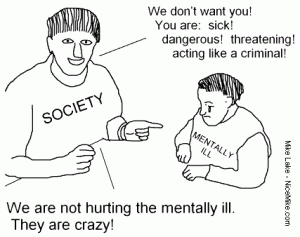China Passes Mental Health Law, Creating More Problems Than Solving Them
 Don’t think that we missed this one. China Law & Policy just hasn’t had the chance to write about it. At any rate, after 25 years of discussion, and two rounds of very vocal public comments in the past year, on October 26, 2012, the Standing Committee of the National People’s Congress finally passed its Mental Health Law (“MHL”).
Don’t think that we missed this one. China Law & Policy just hasn’t had the chance to write about it. At any rate, after 25 years of discussion, and two rounds of very vocal public comments in the past year, on October 26, 2012, the Standing Committee of the National People’s Congress finally passed its Mental Health Law (“MHL”).
One of the major improvements to the law since earlier drafts is the removal of the provision that specifically permitted involuntary commitment if the individual’s behavior was deemed to be “disturbing public order” or “endangering public safety” (see interview with Prof. Michael Perlin about this issue here). Earlier drafts which included that clause were vigorously attacked by both Chinese and foreign experts noting that such a provision would give carte blanche to the police to involuntarily commit anyone who expressed a dissenting view. As Chinese Human Rights Defenders (“CHRD”) highlighted in its seminal report on China’s mental hospitals, The Darkest Corners: Abuses of Involuntary Psychiatric Commitment in China, some of China’s many mental hospital “patients” are in fact dissidents who were involuntarily committed outside of any court process for expressing their dissenting views.
Deletion of this provision is certainly a step forward there are still aspects of the adopted law that make it far less than ideal and demonstrates the continued need for better protections for the mentally ill in China.
Family members are still able to commit an individual against his or her will
In addition to voluntary commitment, Article 28 of the Mental Health Law still permits family members to involuntarily commit an individual  that the family member suspects has a mental illness. In effect, the Mental Health Law places the family in a separate sphere that assumes that family will not abuse the process.
that the family member suspects has a mental illness. In effect, the Mental Health Law places the family in a separate sphere that assumes that family will not abuse the process.
But if the goal of the Mental Health Law is to “protect the lawful rights and interests of those with mental disorders” (MHL, Art. 1) and to integrate those with mental disorders into society, then allowing family members to involuntarily commit individuals runs against these goals by putting those with mental illness or disorders at the mercy of their family. This also runs counter to the Convention on the Rights of Persons with Disabilities (CRPD) which requires that the rights of those with mental disabilities be on equal footing with the rest of society (see CRPD, Article 3(a)). China has signed and ratified the CRPD but the new Mental Health Law is not in keeping with many of the CRPD’s provisions let alone its spirit.
No Court Oversight of the Commitment Process
International human rights law, which the CRPD adopts repeatedly through reference, is clear that any decision to deprive one’s liberty, including on health grounds, is challengeable before a court or other judicial body (see United Nations Commission on Human Rights, Report of the Working Group on Arbitrary Detention (Dec. 2005) Para 63-66).
China’s current Mental Health Law creates a system for involuntary commitment that is completely devoid of any court oversight. When an individual appears at a mental hospital – either voluntarily, brought by a family member, or in the case of homeless individuals, by the police (MHL, Art. 28) – he or she is examined by one of the hospital’s psychiatrists. If the psychiatrist determines that the individual suffers from a severe mental illness and that he or she demonstrates either harm to him or herself or harm to others, then involuntary commitment is required (MHL, Art. 30 – the law here uses “应当” which has the same effect of the use of the word “shall” in English laws, making involuntary commitment mandatory if the facts apply).
 There is no provision to challenge the hospital psychiatrist’s diagnosis in a court of law or even before an independent arbitrator. Instead, if the individual or its guardian disagrees with the initial assessment, he or she can request that the hospital provide a different psychiatrist to do an second assessment or go to another mental hospital to request a second opinion (MHL, Art. 32). It is questionable if another doctor in the same hospital will be a true independent opinion or if he or she will just agree with his colleagues.
There is no provision to challenge the hospital psychiatrist’s diagnosis in a court of law or even before an independent arbitrator. Instead, if the individual or its guardian disagrees with the initial assessment, he or she can request that the hospital provide a different psychiatrist to do an second assessment or go to another mental hospital to request a second opinion (MHL, Art. 32). It is questionable if another doctor in the same hospital will be a true independent opinion or if he or she will just agree with his colleagues.
Similarly, even if the patient or his family requests an evaluation from another mental hospital, (1) under the Mental Health Law, there is no obligation that this hospital do the assessment and (2) it is not clear that the doctors in that hospital will be any more independent. These doctors will still be state employees and colleagues of the original doctors.
If after the second opinion, the patient or his family still disagrees with the assessment, it is only at that point that he or she can go outside of the system and hire an independent psychiatrist of his or her choosing (MHL, Art. 32, ¶3). However, the law makes no mention as to what to do if this third opinion disagrees with the two opinions provided by the state. Article 35 of the Mental Health Law forbids involuntary commitment where the second opinion disagrees with the first, but makes no mention of what to do with the third opinion. Without court involvement, presumably it will not be sufficient to overturn the prior opinions and free the individual.
Guardians Are Too Easily Appointed and Too Difficult to Remove
The Mental Health Law provides a tremendous amount of power an individual’s guardian but provides no method for how that guardian should be appointed. Instead, it is necessary to look to the General Principles of Civil Law which discusses guardianship for individuals with mental illness.
Unfortunately, the General Principles does little to flesh out the appointment process. Instead, it makes clear the level of abuse that can occur.  Article 13 of the General Principles requires the appointment of an agent ad litem (a guardian) for mentally ill individuals who are “unable to account for his own conduct.” But the law does not flesh out what “account for his own conduct means.” Some individuals with mental illness may still be able to lead a relatively normal life and just need help in certain aspects. But the General Principles is much more black and white; much more all-or-nothing and do not allow for that gray area that provides for some independence for an individual with slight assistance from a guardian.
Article 13 of the General Principles requires the appointment of an agent ad litem (a guardian) for mentally ill individuals who are “unable to account for his own conduct.” But the law does not flesh out what “account for his own conduct means.” Some individuals with mental illness may still be able to lead a relatively normal life and just need help in certain aspects. But the General Principles is much more black and white; much more all-or-nothing and do not allow for that gray area that provides for some independence for an individual with slight assistance from a guardian.
Additionally, the General Principles provides no formal or independent process by which a guardian is appointed. Instead, it appears that basically, if a person wants to be a family member’s guardian, she can just declare herself as such (Article 17 of the General Principles pretty much limits guardians to family members although there is a provision for a work unit member). Based on the General Principles, the process for guardianship in China is not an appointment process but rather a declaration one.
Article 17 of the General Principles does contemplate a court action where the individual or someone else might disagree with the declaration of guardianship. But it would be better to involve the court at the initial stage and require it to review guardianship decision to give the relationship any legal effect. In fact, the Article 12(4) of the CRPD requires such a process – that an impartial authority or judicial body review all decisions to limit an individual’s legal capacity, such as the appointment of a guardian. Without judicial oversight of the guardianship process, the process is subject to abuse and the individual with mental illness is again denied his ability to function equally in society with others.
Conclusion
In reality, the Mental Health Law does little to foster an environment where those with mental illness can lead an independent life and be accepted by society. Furthermore, although the law discusses the very real (and dire) need to increase the number of mental health professionals in China, that has remained aspirational. As of yet, the Chinese government has remained silent on how much money and what incentives it will provide to achieve that goal. Providing adequate and sufficient medical assistance for those suffering from mental illness is just as important to making sure that those individuals will be able to lead a full life.
**********************************************************************************************************************************
* Jeremy Daum drafted this translation within days of the Mental Health Law’s promulgation. It wasn’t until now that China Law & Policy had the chance to publish this translation.
 On Facebook
On Facebook By Email
By Email 
[…] detain an individual against their will still remains with the psychiatrist and not the court. And Elizabeth Lynch at China Law & Policy is skeptical that the law will have any real impact at […]
[…] Moreover, the law does little for China’s residents with real mental health problems. (Some scholars say China has one of the highest rates of mental illness in the world.) Attacks on school children by men, many of whom are mentally ill, have continued since 2010. Yet awareness is low, and while the new law calls for more mental health professionals that the country desperately needs, the government hasn’t outlined any concrete plans to train more experts. ”In reality, the Mental Health Law does little to foster an environment where those with mental illness can lead an independent life and be accepted by society,” Elizabeth Lynch wrote for China Law & Policy. […]
[…] Moreover, the law does little for China’s residents with real mental health problems. (Some scholars say China has one of the highest rates of mental illness in the world.) Attacks on school children by men, many of whom are mentally ill, have continued since 2010. Yet awareness is low, and while the new law calls for more mental health professionals that the country desperately needs, the government hasn’t outlined any concrete plans to train more experts. ”In reality, the Mental Health Law does little to foster an environment where those with mental illness can lead an independent life and be accepted by society,” Elizabeth Lynch wrote for China Law Policy. […]
[…] Moreover, the law does little for China’s residents with real mental health problems. (Some scholars say China has one of the highest rates of mental illness in the world.) Attacks on school children by men, many of whom are mentally ill, have continued since 2010. Yet awareness is low, and while the new law calls for more mental health professionals that the country desperately needs, the government hasn’t outlined any concrete plans to train more experts. ”In reality, the Mental Health Law does little to foster an environment where those with mental illness can lead an independent life and be accepted by society,” Elizabeth Lynch wrote for China Law & Policy. […]
[…] Moreover, the law does little for China’s residents with real mental health problems. (Some scholars say China has one of the highest rates of mental illness in the world.) Attacks on school children by men, many of whom are mentally ill, have continued since 2010. Yet awareness is low, and while the new law calls for more mental health professionals that the country desperately needs, the government hasn’t outlined any concrete plans to train more experts. ”In reality, the Mental Health Law does little to foster an environment where those with mental illness can lead an independent life and be accepted by society,” Elizabeth Lynch wrote for China Law & Policy. […]
[…] lead an independent life and be accepted by society,” Elizabeth Lynch wrote for China Law & Policy. Powered by WordPress.com VIP var _qevents = _qevents || [], wpcomQuantcastData = […]
It is good that they are thinking about it because ‘mental health law’ provide a right to how to overcome from mental issues.
[…] China passed its first mental health law in October, after almost thirty years of efforts. The new law is intended to address issues such as patent privacy and wrongful institutionalisation but, according to Elizabeth M. Lynch at China Law & Policy, has a number of loopholes and other flaws which threaten to undermine its effectiveness. […]
RT @ewickeri: RT @PhelimKine: Reported detention of prof who spoke of #Tiananmen Massacre shows perils of #China mental health law http://t.co/a9VwtO0d
RT @PhelimKine: Reported detention of prof who spoke of #Tiananmen Massacre shows perils of #China mental health law http://t.co/a9VwtO0d
RT @PearsonElaine: RT @PhelimKine: Reported detention of prof who spoke of #Tiananmen Massacre shows perils of #China mental health law http://t.co/qrrfKd9C
RT @PhelimKine: Reported detention of prof who spoke of #Tiananmen Massacre shows perils of #China mental health law http://t.co/qrrfKd9C
Reported detention of prof who spoke of #Tiananmen Massacre shows perils of #China mental health law @chinalawpolicy http://t.co/t5DyVz3G
RT @PhelimKine: Excellent @chinalawpolicy analysis of new #China mental health law and its troubling threats to personal freedom http://t.co/GQK192dc
RT @PhelimKine: Excellent @chinalawpolicy analysis of new #China mental health law and its troubling threats to personal freedom http://t.co/GQK192dc
Excellent @chinalawpolicy analysis of new #China mental health law and its troubling threats to personal freedom http://t.co/GQK192dc
Comparative law perspectives needed MT @chinalawpolicy: #China Passes Mental Health Law, Creating More Problems #law http://t.co/0NGyA3RS
Comparative law perspectives needed MT @chinalawpolicy: #China Passes Mental Health Law, Creating More Problems #law http://t.co/eVB74Q3L
China Passes Mental Health Law, Creating More Problems Than Solving Them | China Law & Policy http://t.co/Tk7wi3vB
China Passes Mental Health Law, Creating More Problems Than Solving Them | @ChinaLawPolicy http://t.co/UFyiZtKq
RT @chinalawpolicy: New @ CL&P: China Passes Mental Health Law, Creating More Problems Than Solving Them http://t.co/4ffPpK9m
RT @chinalawpolicy: New @ CL&P: China Passes Mental Health Law, Creating More Problems Than Solving Them http://t.co/4ffPpK9m
RT @chinalawpolicy: New @ CL&P: China Passes Mental Health Law, Creating More Problems Than Solving Them http://t.co/4ffPpK9m